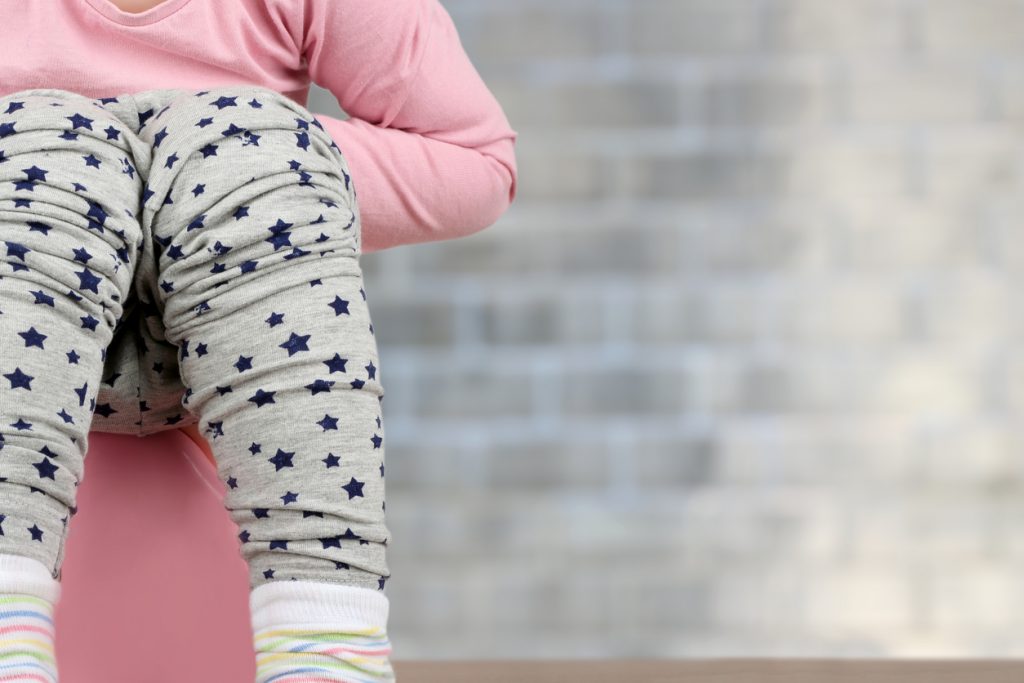Is Your Potty-Trained Child Having Accidents at School?

It usually starts with a whiff.
Maybe you’re cuddling on the couch after school or unpacking backpacks when your nose gets a little twitchy.
No, it can’t be, you think. There’s no way…
But then, after some stealth-mom investigative work, you find the balled-up undies in the bottom of their bag. Or the wet patches on their jeans, buried deep in their laundry hamper.
And you start to sweat, wondering: What’s going on?! How do I fix it?
And the grand mack-daddy of all self-imposed guilt trips:
What did I do wrong?
Is Your Potty-Trained Child Having Accidents at School?
It doesn’t make for cheerful Instagram posts and it’s not exactly something you divulge to your mom acquaintances at the park. It is 100% NOT something you share when well-meaning friends and relatives cheerfully ask how school is going.
But for many kids, especially those starting Kindergarten, incontinence is a very real part of the back-to-school season.
It can be frustrating, and even down-right maddening. With your previously potty-trained child having accidents at school, you feel embarrassed for them and you feel embarrassed for yourself. You can feel overwhelmed and unsure of how to make things go back to “normal.”
So for any of my fellow parents feeling worn down, fed up, or downright confused about their newfound pee and poop problems, here are a few things to keep in mind.
It’s relatively normal…
Depending on where you live, many children start full-time elementary school at three-years-old — an age at which toileting skills are relatively new and bladder and bowel sphincter control is still being developed.
While these skills may have been honed at home or in a pre-school environment, entering elementary school presents a new set of challenges. While still supportive and caring environments, the adjustment can be difficult as our little ones learn the ropes and try to abide by new expectations for behaviour, cooperation, and independence.
If your child is coming home with wet spots in their undies or is having occasional incidents of bowel or bladder incontinence, it’s likely nothing to worry about. It could be that they were too nervous to ask to go, think the bathroom at school is stinky or scary, were too busy playing and put off going a smidge too long, or maybe they didn’t realize that toot brewing was actually a more than a toot.
No matter the reason, try to stay as relaxed and non-judgmental as you can. Chances are they just need some extra support and encouragement to speak up for their needs as they learn to navigate their new environment.
How you do this will be unique to your situation, but here are some general guidelines to help you through if you’re wondering why your potty-trained child having accidents at school:
Normalize their experience
While it can be easy to let your initial shock take over, take a minute for yourself before approaching your kids. If you pause, take a breath, and make a plan before broaching the subject it will help you avoid making statements you’ll later regret.
Simple statements, like, “I noticed some wet undies in your backpack — was everything ok at school today?” can open the discussion without inducing blame or shame. If relevant, sharing a story of your own bathroom mishaps can help them feel like they’re not alone, reassuring them that if you got through it, they can too.
Have them help clean up
It’s important to not over-sympathize or send an “oh poor baby” message in response to your child’s incontinence. Showing kids that toileting incidents are a normal part of life also means showing them — with respect and kindness — how to clean up after themselves. This helps build their sense of personal accountability and responsibility while also sending the message that you believe they are capable and can handle their own needs.
Get to the root of the issue
Without interrogating, try to get an understanding of what led up to their incontinence. It can be hard, especially when we just want to help, but keeping the conversation casual and child-directed ups your chances of getting the 411.
Keep in mind that your child may not have a clue why they peed their pants. It’s not uncommon for a parent or teacher to notice a spot on a child’s pants and the potty-trained child having accidents at school might be completely dumbfounded as to how it got there.
If there’s no rhyme or reason, they might need regular toileting time or extra reminders. This is when it helps to enlist the help of your child’s teacher.
Keep open communication with the school
It’s a cliché, but it’s true — it takes a village, and that includes teachers and school support staff. If toileting has become a concern, ask for a meeting or phone conversation with your child’s teacher to ensure you’re working in concert to support your child’s needs.
I wish this process was always kumbaya and cooperative, but there are times when you may receive push-back or less-than-supportive responses from administration. If something doesn’t feel right, don’t quit. Ask to speak to the principal or vice-principal if you feel you’re not being heard or are being blatantly unsupported. Your child’s needs matter, so don’t stop until you’re satisfied.
(I also wish it was as easy as “don’t stop until you’re satisfied,” but it’s likely to involve a lot of stress and general uneasiness. Advocating for your child can feel like a master class in keeping it together when you want to scream, but I’ve never met a mom who wasn’t up for the challenge. You’re a warrior, mama. And don’t you forget it.)
When to seek help for a potty-trained child having accidents at school…
As with all parenting conundrums, navigating toileting issues is never black-and-white. Here are a few general guidelines to help you decipher when it may be time to seek professional assistance if your potty-trained child having accidents at school:
- Incidents are occurring with increasing frequency
- Incidents are occurring in combination with other new-onset or troubling behaviours
- Your child is leaking urine when they laugh/jump/sneeze
- Your child starts bedwetting after several months of dry nights
- Your child complains of pain when peeing or pooping
- Your child is chronically constipated
- Your child presents as if they are leaking or oozing poo, as this can be a sign of an intestinal blockage
- Blood in their stool or urine
Pay special attention if you notice your child’s incontinence is happening in tandem with any new fears, unpleasant experiences (social issues, incidents with teachers or staff), night terrors, or other concerning behaviours. Since bladder and bowel control is a developing skill, it often acts as the “canary in the coal mine” for young kids dealing with larger physical or mental wellness concerns.
Trust your gut
If something seems off even when everyone is telling you it will pass or is just a phase, something is likely off. Hopefully, you’re wrong and it’s nothing, but if it is something significant or serious you’ll be glad you took action when you did.
Be patient
Whether you’re dealing with run-of-the-mill, to-be-expected incontinence, or broader social-emotional or physical concerns, children’s toileting issues often take time and a whole helluva lot of patience before they’re completely resolved.
As you’re navigating the slog of wet undies and skid marks, please know you’re not alone. Just because it doesn’t make for popular conversation doesn’t mean it doesn’t happen. I’m willing to bet you have friends, relatives, and neighbours stressing about incontinence issues of their own as you’re reading this.
So, my friend, I raise my jug of laundry detergent to you.
Dealing with incontinence stinks, but your kids are lucky to have a mom like you, committed to helping them through.

















Thanks for this article. Our daughter is in kindergarten and about 2 months ago started having accidents at school randomly and now it’s a few times a week type of thing. We are now talking daily with her and have communicated with her teacher. Try to keep it positive and set a 2 time a day in class, even when she doesn’t have to go. But she keeps forgetting and hides it from her teacher. Fingers crossed cause this is hard. And at times I am also wondering what we did wrong. 😫 Any other suggestions would be welcomed. Love from a tired mom. 💜
We are going through it right now! My daughter potty trained early, but since starting school, she’s been having accidents. Our doctor thinks it’s constipation, which makes sense to me because she’s a picky eater. The school is doing their best to support her. My fear is the other kids picking on her for it.
My question is: for other’s who have gone through it, how did it go? When did accidents stop, and was anything you did helpful?
My son Ben just turned five a few days before starting kindergarten and he seems to have a potty accident at school usually once a day at random times . I have talked to him about it and I let him know the teachers are there to help. I think his issue is is that he forgets to take a potty break when he’s in the middle of an activity. He’s smart and will talk your ear off but he just can’t seem to get the potty thing down yet . I pray he figures it out soon .
I just got a call from the School ,that my little girl had a potty pee accident.I would like to know if someone can help me with how to ask the teacher for her assistance without sounding to overwhelming to her or sound…Im just a little worried about her .I haven’t got to talk to her yet she’s at school still .I trust her Teacher she actually taught my son .She’s tough at home and he’s tough at school and opposite at home .lol Anyway I’m rambling any mom advice I was greatly appreciate.Thank you for your article it has already helped a great deal sincerely Jacqueline CREHAN